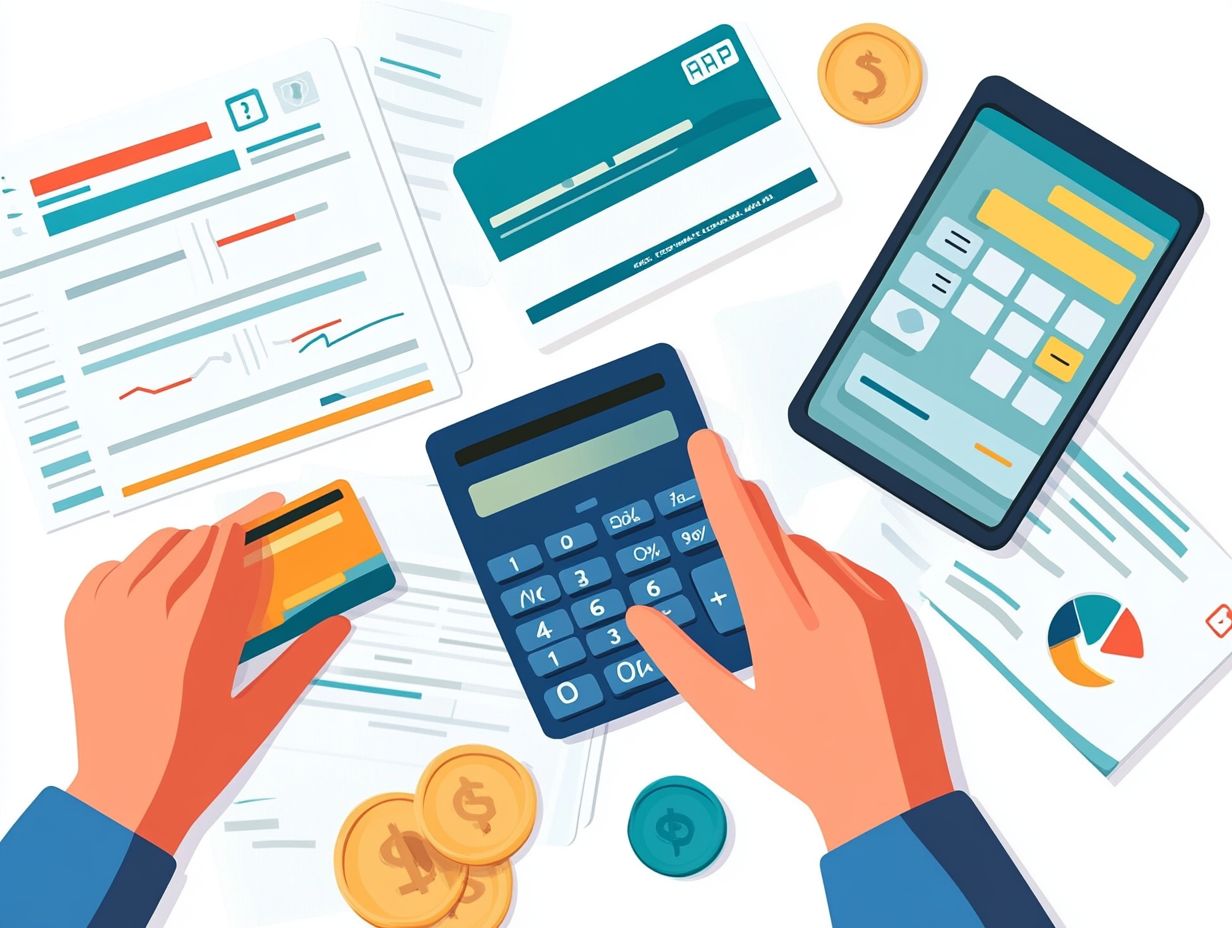How to Avoid Interest Charges on Credit Cards
Credit cards can be a convenient tool for managing your expenses. However, understanding the nuances of interest charges is essential to avoid unnecessary debt.
This article breaks down what interest charges are and how they’re calculated. You will gain a clear understanding of the intricacies involved.
Moreover, it offers effective strategies for steering clear of these charges. Discover invaluable tips on making timely payments and managing your balance wisely.
Explore smart ways to save on interest, including negotiating with your credit card company and leveraging rewards programs. Take charge of your finances today!
Contents
- Key Takeaways:
- Understanding Credit Card Interest Charges
- Strategies for Avoiding Interest Charges
- Other Ways to Save on Credit Card Interest
- Frequently Asked Questions
- What are interest charges on credit cards?
- How can I avoid interest charges on my credit card?
- What happens if I don’t pay off my credit card balance in full?
- Are there any other ways to avoid interest charges on credit cards?
- What should I do if I can’t pay off my credit card balance in full?
- Is it possible to negotiate interest charges on credit cards?
Key Takeaways:

Always pay off your balance in full to dodge interest!
Make timely payments to avoid late fees and additional interest.
Consider a balance transfer to a credit card with a lower interest rate and save money!
Understanding Credit Card Interest Charges
Understanding credit card interest charges is essential for effectively managing your finances. These charges can greatly influence your overall debt repayment strategy.
Credit card issuers calculate interest using various methods. The annual percentage rate (APR) is crucial, as it indicates the yearly cost of borrowing money on your credit card.
By arming yourself with this knowledge, you can make informed financial decisions and sidestep unnecessary interest charges.
What are Interest Charges?
Interest charges on credit cards are the fees you incur when you don t pay your full statement balance by the due date. This results in charges piling up on your outstanding balance.
These charges are usually displayed as an Annual Percentage Rate (APR), indicating the cost of borrowing over a year. It’s vital to understand how APR impacts your overall debt.
If you leave your balance unpaid, interest compounds, significantly increasing the amount you owe over time. You can choose between fixed and variable rates.
Fixed rates offer stability, while variable rates can fluctuate, potentially leading to higher payments. Missing payment deadlines results in late fees and can raise your interest rates, amplifying your financial strain.
How are Interest Charges Calculated?
Interest charges on credit cards are typically calculated using the annual percentage rate (APR). This rate is converted into a daily interest rate applied to your average daily balance throughout the billing cycle.
To understand how these calculations affect your finances, grasp the average daily balance method. This involves summing your daily balances over the month and dividing that total by the number of days in the billing period.
Keep in mind that cash advances often have different rules; they might start accruing interest immediately, without any grace period.
Familiarizing yourself with these aspects enables you to manage your credit card debt effectively and potentially save on those pesky interest charges.
Strategies for Avoiding Interest Charges

Avoiding interest charges is crucial for anyone looking to uphold healthy credit card habits. In a financial landscape where promotional rates may offer temporary relief, remaining vigilant is key, as these rates often revert to higher standard rates quickly.
Don’t miss out on these crucial tips for managing your credit card effectively!
Pay off Your Balance in Full Each Month
Paying off your credit card balance in full each month allows you to fully exploit the interest-free period, keeping your account interest-free while bolstering a strong credit history.
By consistently doing this, you avoid accumulating unnecessary interest charges and showcase responsible credit usage to potential lenders. This routine cultivates healthy financial habits, protecting you from the pitfalls of debt.
The interest-free period offers a valuable chance to manage your cash flow effectively.
Such practices can lead to an improved credit score, as timely payments and low credit utilization signal reliability and trustworthiness. Ultimately, this gives you the power to achieve financial stability and unlock better credit options in the future.
Make Payments on Time
Making payments on time is vital to steer clear of late fees and interest charges. Missing a due date can lead to unwelcome expenses and negatively impact your credit scores.
Many lenders offer an interest-free period, but waiting too long can harm your finances. Keeping a close watch on payment deadlines is essential.
To navigate this landscape effectively, consider adopting strategies like setting up reminders or enrolling in automatic payment plans. These proactive steps will help you dodge late payment pitfalls and foster responsible spending habits.
Ultimately, they pave the way for a more stable financial future.
Consider a Balance Transfer
A balance transfer can be a smart move that saves you money! By shifting high-interest balances to a card with promotional rates, often featuring a low or even 0% introductory APR, you position yourself to save significantly on interest payments.
This strategy can help you tackle your debt faster don t wait!
However, it s essential to carefully check any associated fees, such as balance transfer fees, which could undermine the advantages if overlooked. Understanding the terms of the new card especially the duration of the promotional period and the interest rate that follows is crucial.
By staying informed, you give yourself the power to make smarter financial decisions, effectively managing your overall borrowing costs while reaping the benefits that balance transfer cards can provide.
Other Ways to Save on Credit Card Interest

You have several effective strategies at your disposal to reduce credit card interest. Consider negotiating with your credit card company to secure lower rates; it s often more feasible than you might think.
Opting for a low-interest credit card can also significantly ease your financial burden. Don’t overlook the benefits of using credit card rewards, transforming your spending into savings.
Negotiating with Your Credit Card Company
Negotiating with your credit card company can unlock substantial savings, as many issuers are eager to lower variable rates or offer fixed rates to retain valuable customers like you.
To navigate this process effectively, be well-prepared with a clear, concise case for why you deserve a better rate. Knowing your credit history details gives you a strong advantage in negotiations; a solid track record of on-time payments underscores your reliability and responsibility.
Arming yourself with comparable offers from other companies can bolster your position, encouraging the credit card issuer to match or even surpass those rates. Potential outcomes of a successful negotiation can vary from reduced interest rates to waived fees, making your credit card management far more manageable and affordable.
Start implementing these strategies today to boost your financial health!
Using a Low Interest Credit Card
Utilizing a low-interest credit card can significantly lower your borrowing costs compared to standard cards, making it a smart choice that can save you money!
This financial tool not only streamlines your monthly payments but also accelerates the repayment of existing balances. This ultimately minimizes the interest paid over time.
When comparing low-interest options to traditional credit cards, it’s crucial to acknowledge that these specialized cards often feature lower annual percentage rates (APRs), meaning the yearly cost of borrowing money is reduced, making each dollar you spend feel less burdensome.
You should carefully weigh the pros and cons of fixed versus variable interest rates. Fixed rates offer stability and predictability in your repayments, while variable rates can fluctuate, leading to unexpected increases in your debt.
The right card for you depends on your spending habits and future plans.
Utilizing Credit Card Rewards
Credit card rewards can significantly enhance your financial decisions, opening doors to cashback, points, and other benefits that effectively offset your purchasing costs.
These rewards programs vary in type, each tailored to different consumer behaviors. For example, cashback programs return a percentage of your spending as cash, while points-based systems allow you to accumulate points for travel, merchandise, or gift cards. Travel rewards cards often offer enticing perks, such as airline miles and complimentary upgrades.
Understanding these programs helps you make better choices. Choose rewards that match your spending to get the most benefit, transforming everyday purchases into savings and enriching experiences.
Frequently Asked Questions

What are interest charges on credit cards?
Interest charges on credit cards are fees applied to any outstanding balance. This is the cost of borrowing money from the credit card company.
How can I avoid interest charges on my credit card?
The best way to avoid interest charges is to pay off your balance in full each month. This means paying the full amount shown on your credit card statement by the due date.
What happens if I don’t pay off my credit card balance in full?
If you don t pay off your balance, you will be charged interest on the remaining amount. This interest compounds quickly, making it difficult to pay off your credit card debt.
Are there any other ways to avoid interest charges on credit cards?
Another way to avoid interest charges is to use a card with a 0% introductory APR. You won t be charged interest on your balance for a certain time, allowing you to pay it off without accumulating interest.
What should I do if I can’t pay off my credit card balance in full?
If you can t pay off your balance fully, pay as much as you can! This will help reduce your interest charges. You can also contact your credit card company to see if they offer payment plans or options to help you pay off your balance over time.
Is it possible to negotiate interest charges on credit cards?
In some cases, you may be able to negotiate lower interest rates or have charges waived. It’s worth contacting your credit card company to explain your situation and see if they are willing to work with you.





